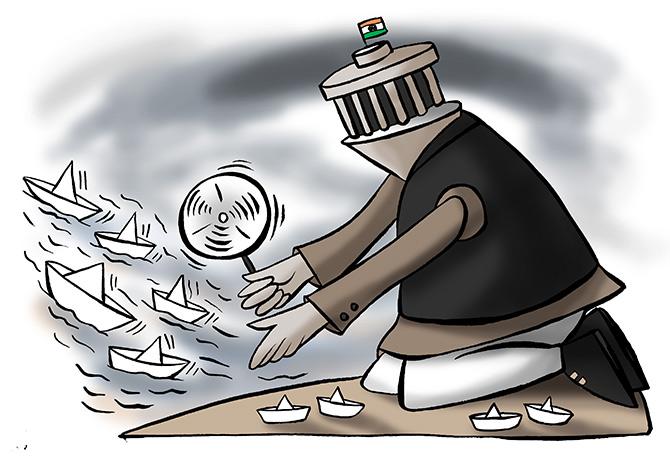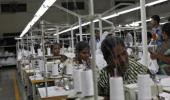With Indian companies still tackling the fallout of the triple shocks of demonetisation, a badly implemented GST and India's shadow banking crisis, this trifecta of trouble has ensured that even in the aftermath of a clear victory for the Modi government, companies show little sign of kickstarting investment, points out Rahul Jacob.
Illustration: Uttam Ghosh/Rediff.com

At the beginning of this decade, a series of labour protests broke out at the high profile factories of multinationals such as Foxconn, Honda and Flextronics in Guangdong, China's powerhouse of a province just across the border from Hong Kong.
The powerful party secretary then was named Wang Yang.
He took a gamble and, in consultation with Beijing, mandated double-digit raises for workers for the next five years, including pay hikes of 20 per cent that year itself.
Instead of sanctioning Communist Party-led disciplining and beatings at the first sign of worker protests as is paradoxically the norm in other provinces, Wang said it was time to use the crisis to move into higher tech exports and via the wage hike push toy, plastic and shoe manufacturers to move elsewhere.
"Empty the cage and let the right birds in," said Wang, drawing criticism from free market economists within China who believed he would upset the export equilibrium that had made Guangdong the factory of the world.
I had just arrived as a correspondent for the FT in the region and was sceptical that the liberal party secretary's industrial policy would work.
Still, it was an opportune time to write about China's huge demographic transition.
Usually referred to as the the Lewis turning point -- that moment when factory owners see their returns fall because surplus cheap labour have dried up.
Due to the one-child policy, the working-age population peaked earlier than it should have in China in 2015.
As businesses began to relocate from Guangdong to other Asian countries, this seemed the moment when India's fabled demographic dividend of an abundant young workforce would surely be reaped.
The rest is history, a familiar Indian story of missed opportunities and own goals.
India's exports peaked in 2013 at 25 per cent of GDP before faltering.
As Sajjid Chinoy pointed out in a paper for last year's India Policy Forum, India's GDP growth rate surged between 2003 and 2008 because net exports grew by 18 per cent annually between those years.
"Exports were driving investment... India had briefly turned Asian," Chinoy noted.
By contrast, in the past year or so, the economic research firm I now work for, Wigram Capital Advisors, has calculated that on a compounded five year average India's export growth rate has fallen to the low single digits, comparable in India's history only to the doldrums of the 1950s when the licence raj was being put in place.
I recently checked Guangdong's exports tally to see if Wang's bet to move it up the value chain had paid off.
Exports grew 4 per cent in 2018 -- not a bad showing amid trade tensions -- to almost $650 billion in 2018, or twice India's annual total of manufactured exports.
With Indian companies still tackling the fallout of the triple shocks of demonetisation, a badly implemented GST and India's shadow banking crisis, this trifecta of trouble has ensured that even in the aftermath of a clear victory for the Modi government, companies show little sign of kickstarting investment.
Rural spending is yet to pick up fast-moving consumer goods companies tell us, auto sellers are complaining of record drops in sales and the death watch about which shadow bank will go under continues on Dalal Street.
2019 is shaping up not as a new beginning but as a summer and winter of discontent.
Recently, the new government in what was once globally lauded as business-friendly Andhra Pradesh pushed through a directive that will force private companies to reserve jobs for locals.
Also recently, a cross-section of film-makers and writers banded together to call on the Modi government to punish and condemn those accused of mob lynchings.
These two seemingly unrelated events are two sides of the same cancelled cheque for India's much hyped demographic dividend that we never succeeded in cashing.
Now, our alternatives are grimmer: our leaders will exploit the situation for political gain even if it means encouraging violence or at best resort to reservations and increased subsidies through variations of income support.
Recurrent mob attacks on minorities and the South's newest leader resorting to reservations are examples of what might be called the Thackerayisation of India's politics after the late Shiv Sena leader.
After years and years of anemic export and job growth, millions of bored or frustrated young men remain under-employed or unemployed.
Thinking about the seminal events of this disturbing week with the revised Right To Information weakening institutional independence further, I chanced upon an article in The Economist that observed, "It is possible that population is destiny, other things being equal, but other things are never equal.
A plague here or a fateful decision by a Chinese emperor there can set a region down a path that wipes out the advantages of population.
Perhaps those advantages must be harnessed by the right sorts of institutions."
With weaker government institutions than most of our Asian neighbours, and myriad looming challenges ranging from water shortages across this unfortunate country to the consequences of picking on minorities in Parliament elevated to a de facto national sport, the ticking of India's demographic time bomb only gets louder.












 © 2025
© 2025